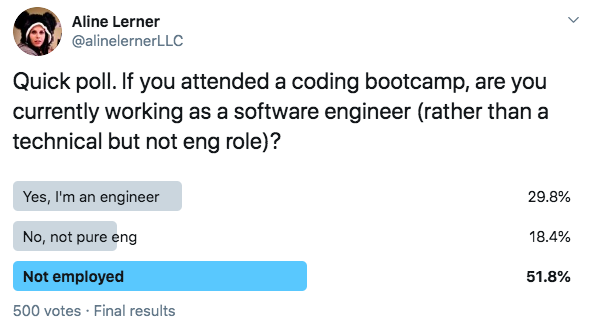I get a lot of emails from prospective career changers who’ve read my stuff (especially the one in Forbes where I went off about how MS degrees in computer science are snake oil) asking for advice about breaking into software engineering.
Many of them ask about bootcamps. Almost all are surprised by the harsh reality that, though bootcamps can be a perfectly useful and valid start to your career change journey, they are not the magical panacea that they purport to be… and that a true career change is going to take a lot of blood, sweat, and autodidactic tears after graduation for most people.
Why do I believe this? A few reasons. First, I did a Twitter straw poll about post-bootcamp outcomes a while ago, and it was pretty grim:

Of course, Twitter straw polls aren’t science or even really data. What *is* data is how bootcamp grads perform in technical interviews. At interviewing.io, we’ve run pilots with most reputable programs at one point or another, hoping that we’d be able to place their students. The sad truth is that almost every current bootcamp student who participated in interviewing.io’s mock interview pool failed. To be fair, our audience is usually senior engineers, but interviewers see candidate seniority and do adjust question difficulty. Despite that, the outcomes were not encouraging.
It’s not that the students don’t have potential. It’s that every program I’ve seen doesn’t dedicate nearly enough time in the curriculum to interview prep. Technical interviews are hard and scary for everyone, even FAANG engineers with 5+ years of experience. The idea that you can teach someone who’s never coded before big O notation AND get them proficient at writing efficient code and articulating trade-offs in 2 weeks (this is how long I’ve heard the most reputable programs spend on technical interviewing) is laughable.
So, without further ado, for those of you considering attending a bootcamp, these are the questions you should ask.
- Do you ask people to leave before graduation if they’re struggling?
- Does your job placement rate include just graduates?
- Is your job placement rate an average of all cohorts or just a few/the best ones?
- What is considered “getting a job”? Does it include people who are working on contract or part-time? Does it include people who are now TAs or instructors at the bootcamp? Does it include people who found work doing something other than software engineering?
- What is the median salary of grads (not just the average)? And do those numbers include part-time work/other job titles or just full-time software engineers?
- For the students who ended up at FAANG, what were their backgrounds? Were they electrical engineering majors? Physics students? What portion of people who ended up at FAANG didn’t know how to code before doing the bootcamp?
- What portion of your curriculum is dedicated to technical interview prep?
- How many mock interviews with industry engineers (not peers or instructors) will I get as part of the course?
Let me know if these questions help you in your adventures, brave heroes. Another resource you can use is the CIRR — they’ve created a standardized request form that bootcamps can use to report outcomes, and you can see outcomes from participating bootcamps for H2 (second half) of 2018. It’s not everything, but it’s a start.
A coding bootcamp is a technical training program that teaches the parts of programming with the biggest impact and relevance to current market needs. Many coding bootcamps don’t spend much time on algorithms. And many courses focus on learning tools rather than on programming. You should prepare for all your questions before attending a coding bootcamp.